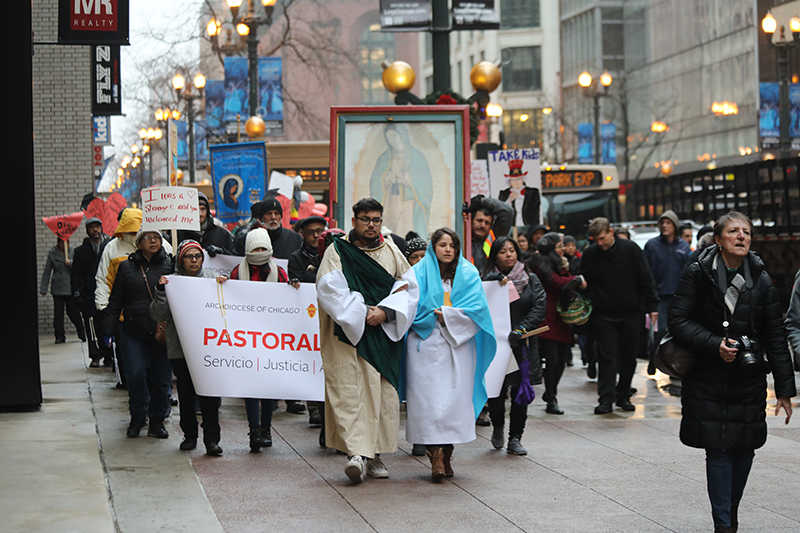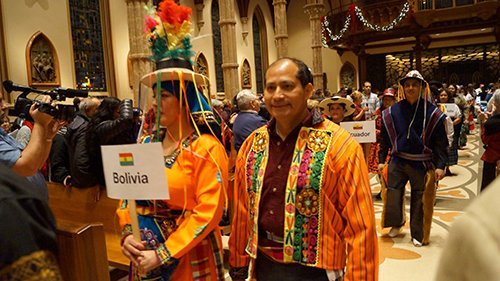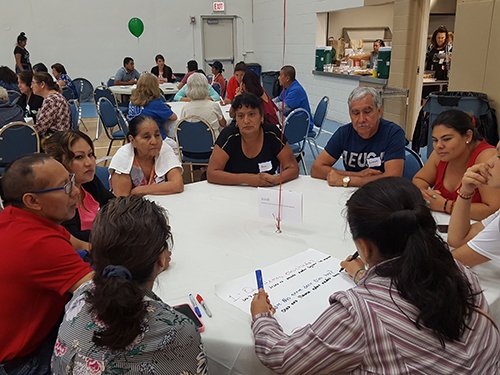Empowering immigrant leaders through Pastoral Migratoria: my family is not alone!

From marches to prayer vigils and parishes in Chicago, FSPA is serving Hispanic immigrants.
Photos by Archdiocese of Chicago
"One morning, ICE agents showed up looking for my two brothers. We didn’t open the door until we contacted a lawyer and my ministry coordinator. My brothers were apprehended later that day when they left for work and are now facing deportation. Pastoral Migratoria mobilized their network and has been accompanying my sisters-in-law and their seven children with emotional support, food and clothing. It has been a devastating time and many tears have been shed, but because of Pastoral Migratoria, my family is not alone!”
This personal reflection, written by a woman named Catalina, is titled “A Knock on the Door.” For the blessing of the training Catalina had received through Pastoral Migratoria, an Immigrant Social Ministry program of the Archdiocese of Chicago in Illinois, she knew not to answer. “I have helped many people in my years as a Pastoral Migratoria leader, but I never could have predicted that one day I would be the one in need.”
Pastoral Migratoria “is dedicated to serving Hispanic immigrant parish communities in which immigrant lay leaders are commissioned to respond to their baptismal calls through service, justice and accompaniment actions,” says Archdiocese of Chicago National Senior Coordinator of Immigration Elena Segura. As it is parish based, the ministry is unique. “Currently, more than 40 Hispanic parishes in the Archdiocese of Chicago offer Pastoral Migratoria training,” reports Elena. And the program keeps growing. This ripple effect is fed in part by the support of Franciscan Sisters of Perpetual Adoration.

The funding is helping to further expand Pastoral Migratoria into the suburbs of North and West Chicago, to foster “partnerships with collaborating organizations and institutions,” to facilitate “ongoing planning and delivery of the formation, leadership training and pastoral work of the lay leaders,” and to fortify “resources, services and training offerings,” says Elena.

The greater its resources, the deeper Pastoral Migratoria can go into parishes and their immigrant communities with an “ever-increasing variety of offerings to meet the myriad needs and challenges of families.” She reports that, in the past year, 250,000 resources for education in areas of law, mental health, employee rights, DACA, deportation, fraud, emergency planning, crime prevention and more were distributed by more than 170 Pastoral Migratoria leaders and 125 Hispanic parishes. Partners include Catholic Charities, Chicago Legal Clinic, National Immigration Justice Center, Mano a Mano Family Resource Center, Arise Chicago, Spanish Coalition for Housing, Chicago Alternative Policing Strategy, and many others. In the Chicago suburbs, 1,800 people were served by the mobile consulting service Consulado Movil. In collaboration with the Consulate of Mexico, 120 people received assistance from Jornadas Sabatinas, social services provided on Saturdays and Sundays. “Expanding means to recruit new lay leaders and reach new parishes and communities. In 2019,” says Elena, “34 new Pastoral Migratoria leaders from seven parishes received formation and were commissioned.”
FSPA’s presence within the program is not merely monetary. Franciscan Sister of Perpetual Adoration Katie Mitchell has been with them in Chicago, her shoes literally on the ground, marching with Pastoral Migratoria during its annual Posada for Immigration Reform. She has also participated in the Broadview Immigration Processing Center rosary prayer vigil. “My life has been changed by the many 'encuentros,' the Spanish word for encounters, I have had with my immigrant and refugee sisters and brothers,” she shares. “I have experienced God’s presence so many times in encuentros with families seeking compassion, safety and protection. Now more than ever I believe that FSPA is being called to stand up for the rights and voices of immigrants and refugees and to walk with them on their camino. Aquí está Dios. Yes,” asserts Sister Katie. “God is here.”
When asked what all of this means to the people Pastoral Migratoria serves, for the future of the program, Elena shares her own reflection. “The support of FSPA gives Pastoral Migratoria leaders like Catalina the opportunity to be missionary disciples who give back to their parish communities. They can walk with their brothers and sisters through their challenges and sufferings in this country and recognize how God is actively present, engaged and embracing them with his love and providential care. These are transformational and life-changing experiences! Your generosity helps enable Pastoral Migratoria to continue reaching, evangelizing and ministering to the most vulnerable communities in our midst.”
